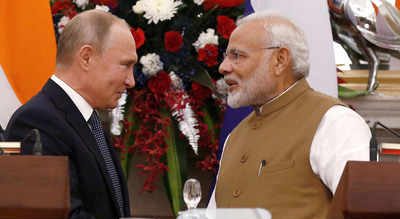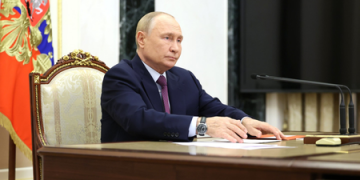New Delhi: Brushing aside US threats of sanctions, India and Russia Friday concluded a deal for supply of S-400 Triumf long-range surface-to-air missile system giving a substantial boost to air defence capabilities of the Indian Air Force.
The $5.4 billion (around Rs 40,000 crore) deal was concluded during the 19th India-Russia Annual Bilateral Summit between Prime Minister Narendra Modi and Russian President Vladimir Putin, though both the leaders made no mention of it in their statement to the media, apparently in view of the sensitivities involving the United States that has been pressing India not to go ahead with the deal.
Nor was the missile contract part of the signing ceremony for eight deals inked by the two sides in the presence of the two leaders covering areas of space cooperation, railways, nuclear cooperation, fertilisers and micro, small and medium enterprises (MSME).
An indication of the missile deal being concluded came in the joint statement issued by the two sides shortly after the talks between the leaders.
“The (two) sides welcomed the conclusion of the contract for the supply of the S-400 long-range surface-to-air missile system to India,” said the joint statement.
The S-400 missile deal has been an issue of much speculation after the Trump administration’s law — Countering America’s Adversaries Through Sanctions Act (CAATSA) — came into effect in January aimed at countries doing business with Russian, Iranian and North Korean defence companies. Washington has so far declined to make any exception to India by way of a waiver.
In his address to the media, Modi said that India-Russia relations are unique and that President Putin has personally contributed to it.
He said both the countries have agreed to work for a multipolar and multilateral world and work together in Afghanistan, the Indo-Pacific region and forums such as Shanghai Cooperation Organisation (SCO), BRICS, G20, and the Association of Southeast Asian Nations (ASEAN) besides cooperating in the fight against terrorism.
 He said Friday’s summit will give a new direction to the Special and Privileged Strategic Partnership that India and Russia share and that the decisions taken today would increase bilateral cooperation, contributing to stability and peace in the world.
He said Friday’s summit will give a new direction to the Special and Privileged Strategic Partnership that India and Russia share and that the decisions taken today would increase bilateral cooperation, contributing to stability and peace in the world.
On his part, Putin said the two countries have been long connected through a strong relationship of friendship. He said both sides discussed topics of international and regional agenda.
The Russian President said India always gave priority to the relations with Russia which has always been part of India’s growth story.
The joint statement reaffirmed the commitment to enhance military technical cooperation between India and Russia, which has a long history of mutual trust and benefit.
“Both sides expressed satisfaction at the significant progress made on the ongoing project of the military technical cooperation and recognised the positive shift towards joint research and joint production of military technical equipments between the two countries.
Curbs on Russia not to harm allies: US
New Delhi: In a guarded reaction, the US Friday said its intent to slap sanctions against Russia was not aimed at imposing damage to the military capabilities of its “allies or partners.” Stating that the intent to slap sanctions on Russia was to impose costs for its “malign behaviour”, the US also made it clear that any waiver will be considered on a transaction-by-transaction basis. Responding to a query on impact of anti-Russia sanctions on India, the US embassy spokesperson said, “waivers of the CAATSA section 231 will be considered on a transaction-by-transaction basis. The intent of our implementation of CAATSA is to impose costs on Russia for its malign behavior, including by stopping the flow of money to Russia’s defense sector. CAATSA is not intended to impose damage to the military capabilities of our allies or partners,” the spokesperson added.







































